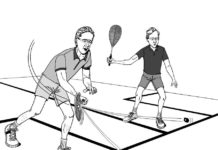By Rod Symington, WSF Referees and Rules Committee
One of my regular correspondents supplies me with material to make my life as a monthly columnist much easier: his matches frequently produce scenarios that are useful for instructional purposes. You might even say he has a talent for getting himself into unusual situations on the squash court. His latest missive to me described an episode that occurred in the U.S. National Age-Group Championships recently:
My opponent hit the ball from the front of the service box on the right side of the court and the ball came back toward himself as he tried to clear to the left. He got to the left side of the service box when I came up behind him to play the ball that was just in front of him. I stopped for a let (believing it was a stroke) because my left hip was about to run into his posterior and the ball was within reach.

The referee said, “No let.” “What???” I said, “With the ball here (right at the front of the service box), and my opponent at the front left edge of the service box and me basically on top of him, how is that not a stroke, never mind a no let??” The referee steps through the door as I’m saying this and says, “You’re right, it’s a stroke.”
So now my opponent is exasperated and says: “How do you go from no let to stroke?”
The referee then says: “Okay, I’m going to meet you half way; play a let” Ugh! This call, of course, came at 9-9 in the fourth. So instead of putting me up 10-9 and serving for the game, I’m not serving at 9-9 (again).
Inevitably, the next rally ended in a similar way, except this time with me in front and my opponent just behind me asking for a let (but the ball was higher and out front). As fate would have it, the referee said, “Stroke.” My response: “How is this a stroke, when the last call was a no let, and you then agreed it should be a stroke, only to be talked into a let?”
What should the referee do when he reaches the conclusion that he made the wrong decision and then tries to correct it, only to then compromise?
Unfortunately, I am sure there are many readers who are saying right now: “That happened to me, too!” There is no easy answer to the dilemma described by the unhappy player; only when the general level of refereeing improves greatly will such situations become less frequent. That is a massive task, and one that can only be undertaken by Associations involved in all levels of the sport. Readers of this column need to urge their relevant Associations to take steps to improve refereeing—and to improve their own refereeing skills as well.
Indecisiveness and inconsistency, both demonstrated by the referee in the above scenario, are the worst sins in squash refereeing, and players at all levels never stop complaining about them. The referee in the cited match was clearly out of his depth (you cannot go from “no let” to “stroke” to “let” and still be considered qualified; he was simply guessing), and the only answer for the players is to rise above the problem and play the game in the right spirit. After losing in the first round at Canary Wharf in March, World No. 5, Nick Matthew, said something very wise: “You don’t lose a match on one rally, where there are perhaps 130 rallies in a match.”
Every referee makes mistakes—I make one mistake per match on a regular basis—and even when using the far superior Three-Referee System, errors still occur (such as the one that robbed James Willstrop of the British Open Championship last year).
To answer my correspondent’s question, “What should the referee do?” First, don’t guess. Second, don’t ever go from “no let” to “stroke.” If you do so, the players will have absolutely no confidence in any of your decisions. (The referee in the above scenario could have said “let” to save his skin). Third, don’t try to appease both players after a discussion by being a coward and saying: “I’ll meet you half-way; let’s play a let.” Neither of them will respect you for that. Fourth, if you do realize that you have made an error, move on—do not dwell on it, but resolve to put it behind you and get the rest of your decisions right.
I hope this satisfies my correspondent because if it doesn’t, I may not get paid this week. He is the Editor in Chief of this esteemed journal.





